Articles about reggae music, reviews, interviews, reports and more...
Respect to Lucky Dube

Respect to Lucky Dube
An intimate portrait of the life and legacy of Lucky Dube, the King of African Reggae.
Sampler
 Bob Marley said,
Bob Marley said,
‘How long shall they kill our prophets
while we stand aside and look’
But little did he know
that eventually the enemy will stand aside and look
while we slash and kill our own brothers
knowing that already they are the victims of the situation
- Victims (1993)
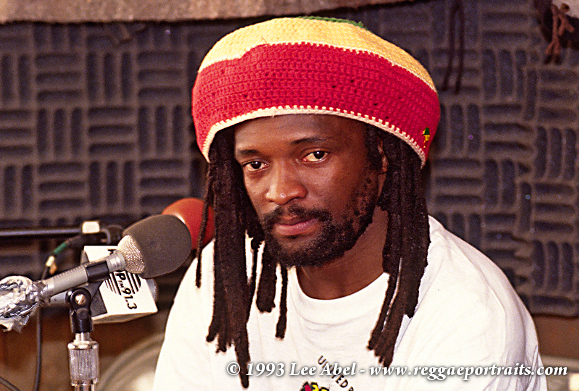
Delivered by his grandmother on a farm near the small mining town of Ermelo on August 3, 1964, he wasn’t given a name. He wasn’t expected to live. But like every other challenge, save one, that was to follow in his 43 years, he refused to be a victim. The apartheid system in South Africa provided little opportunity for proper health care, quality education, or employment. Its rigid laws cruelly dictated the movements of black families and individuals. Furthermore, his father had a liquor habit and abandoned the family before he was born. His mother Sarah left shortly after to seek domestic work in Johannesburg, hoping to send money back, rarely able to. He stayed behind in the mud hut; his beloved grandmother caring for him, nourishing him, body and soul.
At 6 months the boy, the very lucky-to-be-alive boy, was finally given a name, Lucky Phillip Dube. He stayed on with his grandmother, perhaps the single most influential person in his life. She would often go days without food, making sure Lucky and his siblings ate. When things became desperate, they would sneak and collect sheep droppings from a neighboring farm to boil up into some meager sustenance. At 5, Lucky had already learned the lesson of responsibility. He began working as a gardener for white families so that his own family would have a little food. He quickly saw that his employers treated their dogs better than him. When he was a little older he was terrorized by a pair of hounds while their owners laughed. More physical pain would come at the hands of one of his employers who intimidated him into receiving several high voltage shocks in a sadistic experiment with a new toy.
At 8 he began attending school and continued working off-hours. He had to walk nearly 9 miles, get up at 5 every morning, and often go the whole day without food in order to get an education. As a library assistant, he discovered an entry on Rastafari in the encyclopedia that was to make a lot more sense to him when he later discovered reggae music coming out of Jamaica. Jimmy Cliff was the artist most well known to South Africans at that time, because his non-threatening music was played on the radio. The more revolutionary music of Marley and Tosh was underground, much of it banned. If caught with one of their cassettes, your health and freedom were on the line. Lucky listened whenever he could.
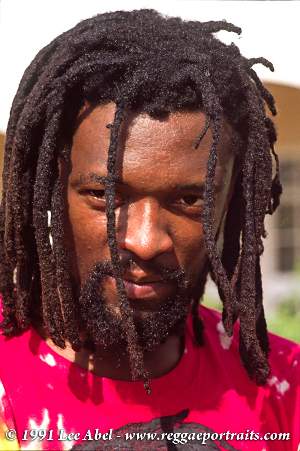 In high school Lucky moved to his uncle’s where his home life continued to be harsh, yet he was making creative strides at school. He joined one of the choirs and soon stepped into the role of choirmaster when the teacher assigned to it lost interest, leading them to a third place victory in a multi-school competition. He organized his first band, The Skyway Band, and “borrowed” instruments from a teacher until they were discovered practicing and the instruments locked away. At 18 he moved again, this time to his aunt’s house where he finally found both sustenance and kindness. His cousin Richard Siluma, 10 years his senior, began to mentor Lucky. Richard was in a band called the Love Brothers that played a traditional Zulu music called mbaqanga. Recognizing Lucky’s vocal talent, Richard accepted him into the band. A remarkable success story on his own, Richard had worked up the ranks at Teal Records (later known as Gallo).
In high school Lucky moved to his uncle’s where his home life continued to be harsh, yet he was making creative strides at school. He joined one of the choirs and soon stepped into the role of choirmaster when the teacher assigned to it lost interest, leading them to a third place victory in a multi-school competition. He organized his first band, The Skyway Band, and “borrowed” instruments from a teacher until they were discovered practicing and the instruments locked away. At 18 he moved again, this time to his aunt’s house where he finally found both sustenance and kindness. His cousin Richard Siluma, 10 years his senior, began to mentor Lucky. Richard was in a band called the Love Brothers that played a traditional Zulu music called mbaqanga. Recognizing Lucky’s vocal talent, Richard accepted him into the band. A remarkable success story on his own, Richard had worked up the ranks at Teal Records (later known as Gallo).
As a record producer, Richard recorded Lucky’s first album Lucky Dube and the Supersoul (1982), on which Lucky sang but did not write. By his third album Lucky was financially comfortable and was working on proficiency in English in order to communicate his message to a wider audience. Reggae became the vehicle for these messages, with lyrics reflecting the anguish of daily life in South Africa as well as the uplifting spiritual vocabulary of the Rastafarians. He was particularly influenced by the militancy of Peter Tosh’s music and the stark similarities between oppression of blacks in Jamaica and those in institutionally racist South Africa. He began adding these songs to his concerts and they were enthusiastically received. The concerts were getting longer and included a mbaqanga set and a reggae set. It was clear early on that Lucky was a dynamic, high-energy performer who enjoyed jumping into the crowd and running around the venues while he sang. Richard, who had first seen Jimmy Cliff in 1976, felt the time was right and encouraged his cousin to do a reggae album.
After 5 chart-topping mbaqanga albums, Lucky and Richard went into the studio in 1984 and recorded Rastas Never Die. The South African Broadcasting Corporation banned it from airplay. The album bombed. The record company was not happy. The semi-autobiographical film Getting Lucky, complete with Lucky Dube mbaqanga soundtrack, had come out and Teal didn’t want to lose their mbaqanga star to an unpopular musical genre. Never to be deterred, the duo tried again the following year. In 1985 “Think About The Children” began to sell and Lucky’s reggae career was set. “Think About The Children” later transformed into one of his well known hits, “Born To Suffer,” in which he clearly expressed his concern for those children, like himself, who grow up without a parent.
Before moving on to more reggae projects, Lucky and Richard had one more detour. They recorded a satirical Zulu/rap album in Afrikaans Help My Krap (meaning “Help Me Scratch”) under the pseudonym of Oom Hansie (“Uncle Hans”). It was a success as well and Lucky added a third set to his shows. Careful to conceal his identity, he wore a variety of disguises. Eventually he had to stop out of sheer exhaustion and fear for his safety from the surging crowds trying to unmask him.
In 1987, apartheid was strong, civil unrest was increasing, and Lucky was back in the studio making his strongest statement yet, a seven track album simply entitled Slave. David Segal, a white Jewish South African, was brought in and became Lucky’s lifelong engineer and friend. The title track spoke to the evils of alcoholism, including the lyrics, “I’m a slave, just a liquor slave.” Many heard “legal slave” instead of “liquor slave.” This, coupled with Lucky naming his backing band “the Slaves,” elevated him to a messenger of social and political change. The album was a wild success, selling over 500,000 copies. Lucky Dube and the Slaves now played all-reggae shows to cheering fans of over 50,000 in South Africa, and began what would become a lifetime of international touring.
 Too many people
Too many people
Hate apartheid
Why do you like it?
Hey you Rasta man
Hey European, Indian man
We've got to come together as one
- Together As One (1988)
Lucky had a vision of a colorblind society. Hurt by the injustices heaped on him by the apartheid system, he was not bitter. Instead, he sought solution through his lyrics and in the process, risked his life to tell the truth. At a time when to sing the word “apartheid” was dangerous, let alone to criticize the government, Lucky became the first black artist played on a white radio station, with the initially banned Together As One title track.
Prisoner, the next album, sold over a million copies. Alongside themes of personal responsibility (education and crime in “Prisoner”) and aching loss (abandonment in “Remember Me”), Lucky continued to lambaste the government.
 Bury down apartheid
Bury down apartheid
Fight down war and crime
Racial discrimination
Tribal discrimination
- War and Crime (1989)
Captured Live (1990) was his only live album, followed closely by House of Exile. In Exile’s title track Lucky sings, “Freedom fighter standing on a mountain…All he dreams about is the freedom of the nation, when every man will be equal in the eyes of the law.” The freedom fighter is Nelson Mandela, whose name could not be mentioned at that time in South Africa; the mountain is Robben Island, the infamous prison used to isolate opponents of apartheid. Also on this release is a deeply personal song Lucky would go on to sing with Peter Gabriel nightly when they toured together in 1993. The song “It’s Not Easy” was about his painful divorce after a short year of marriage. As he told me years later, “I had a shitty childhood; I didn’t want to have a shitty marriage.” Lucky also played on Gabriel’s first American WOMAD festival in 1994.
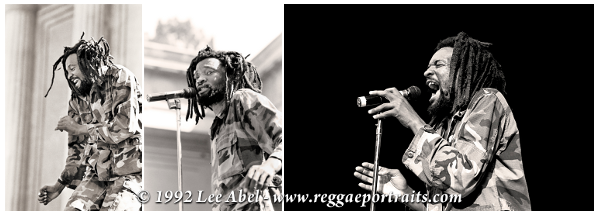
On July 17, 1991, Lucky Dube, dressed in fatigues and military boots, bounced on to the stage of the world’s premier reggae festival, Sunsplash Jamaica. Backed by the always tight Slaves, complete with horn section and gorgeous trio of female singers (comparisons to the I Threes duly noted), he immediately commanded the respect of both the crowd and the promoters. His voice was silky smooth, ranging effortlessly from baritone to falsetto. While the music was roots reggae, the dance was more of a South African Mbaqanga, and involved choreographed moves with the singers and band members. The Jamaicans loved him and demanded the only encore of the show. He would play Sunsplash again in 1992, following the Sunsplash U.S.A. tour. Not until 2007did Lucky again accept an invitation to perform in Jamaica, this time for the Cricket World Cup Opening Ceremonies.
 Breaking those barriers
Breaking those barriers
All over the world
Was not an easy thing
- Different Colours – One People (1993)
It was not easy for a South African musician to tour overseas given the embargo on the country in those waning days of apartheid, but he overcame obstacles barring his travel, and continued dazzling crowds and selling albums. Victims (1993), the last album released before the African National Congress was voted to power, sold over a million copies. With the country’s first one person/one vote election pending, and a high illiteracy rate among the new voters, Lucky took time out to visit farms and help educate his people on how to read and mark the ballots. More than once he had to run for his life when an angry landowner, gun in hand, disapproved of his services.
With Nelson Mandela finally in office, it was time to lighten up…just a little bit. Trinity, released in ’95, contained the hit “Feel Irie,” which was Lucky’s way of rejoicing after all his country had been through. He also urged people to take responsibility for their lives.
 The way to get our economy strong
The way to get our economy strong
Is to have an educated nation
And if you think affirmative action is the way out
No way…no way
- Affirmative Action (1995)
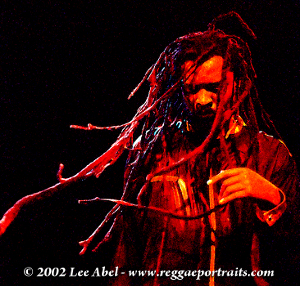 With the release of Serious Reggae Business, a compilation of 10 years of hits, Lucky won Best Selling African Recording Artist at the World Music Awards in Monte Carlo in 1996. It was only one of the over 20 national and international awards Lucky received during his lifetime.
With the release of Serious Reggae Business, a compilation of 10 years of hits, Lucky won Best Selling African Recording Artist at the World Music Awards in Monte Carlo in 1996. It was only one of the over 20 national and international awards Lucky received during his lifetime.
The ANC was firmly in power, but Lucky did not stop criticizing the system. If he saw injustice or incompetence, he wrote about it, no matter the color of the perpetrator, no matter the consequence to himself. On “Taxman,” he complained of where his taxes go when there is so much crime in the street. And in “Guns & Roses,” another song off Taxman (1997), he bemoaned tribalism:
 One time we were judged by the colour of our skin
One time we were judged by the colour of our skin
Now we are judged by the colour of our flags
Let us unite against being divided
Lucky’s music continued to mirror the concerns of Africans, and no song is more telling than the prophetic “Crime and Corruption” off The Way It Is (1999):
 Do you ever worry about your car being taken away from you
Do you ever worry about your car being taken away from you
In broad daylight
Down highway 54
Do you ever worry about your wife becoming
The woman in black
Do you ever worry about leaving home and
Coming back in a coffin
With a bullet through your head
AIDS was another raging concern in his home country, indeed in the world. On the Soul Taker album, Lucky cautions:
 Things we have learned from our good & loving parents
Things we have learned from our good & loving parents
When temptation comes it all becomes useless
Like an ashtray on a motorbike
In everything you do remember
The body bag hangs next to the first aid kit
- Sins of the Flesh (2001)
At this point in his career, Lucky was much more popular outside of his country than in it. While his music was rarely heard on the radio there, he was considered nearly a god in other African countries. His fan base continued to grow globally. On the title track to The Other Side (2003), Lucky takes us on a trip between Jamaica and Soweto to point out the irony between Jamaicans who want to return to the motherland, and South Africans who want to run away to the West:
 He has changed his African name
He has changed his African name
To a western one
‘Cause he doesn’t know how it hurts
To have a name you can’t be proud of
Panties were thrown on to the stage during his performance at Reggae on the River in 2002. Afterwards I asked him, “how come people throw marijuana on the stage for the other artists and panties for you?” With a shy smile and a twinkle in his eye, he said “maybe that’s because they know I don’t smoke.” Viewed as a Rasta by many, Lucky did not rest easy with that definition. For him, Rasta was not about smoking herb or flashing dreadlocks, it was about consciousness on a social, political and personal level. It was about fighting the system with words and music, and living upfully. He did not believe in the divinity of Haile Selassie. Eventually he was drawn to the prophet Isaiah Shembe, and became one of the most notable members of the Nazareth Baptist Church. The Shembe Church is uniquely African, merging traditional Zulu custom and dress with ancient Christianity, creating a modern messianic movement. Lucky met his wife in the church, a beautiful woman 18 years his junior, and with her finally found the stability of family life he so desired. They had three sons together, the last just 4 months old when his father died. With typical humor, Lucky wrote me in 2005: “We went to church today, and I got a big fright when they said; TODAY’S SERVICE WILL BE DONE BY MR DUBE FROM BEGINNING TO END. I looked around even though I knew I am the only Dube there. BUT I spoke okay I guess. They did not stone me or walk out whiles I was talking.”
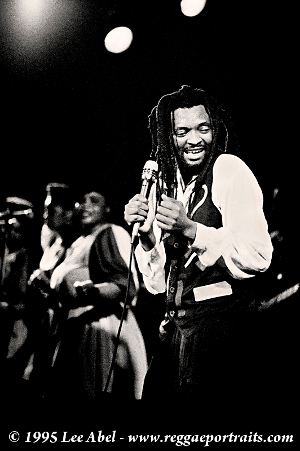 Lucky’s mission in life never changed. It was to educate, entertain, and unite. Playing on the Johannesburg stage, the Live 8 [“Global Call to Action Against Poverty”] benefit in 2005 was a perfect venue for him. In 2006, his last album of original material carried the mission forward. He wrote me saying, “There is a song there that talks about, well, politicians. When it is time to vote, they go to people’s homes, shake hands with the elders, kissing and holding little babies you know the shit, and then they disappear. There are a lot of unfulfilled promises here, and a lot of unhappy people who even threaten not to vote on our upcoming local government elections. One Monster DIES ANOTHER ONE COMES ALIVE.” Respect is the most intricately crafted of all his releases, fusing classic reggae with African rhythm and soul over lyrics that are poignant, cautionary and hopeful. We hear pure joy when he tells us to “Celebrate Life,” thankfulness in “Shembe Is The Way,” and frustration with “Political Games.” Above all, we hear his parting wisdom on the title song. As he said on his last tour in September 2007, “You can not love somebody if you don’t respect them. So even if we don’t agree with certain things in life, if we respect each other, everything will be cool.”
Lucky’s mission in life never changed. It was to educate, entertain, and unite. Playing on the Johannesburg stage, the Live 8 [“Global Call to Action Against Poverty”] benefit in 2005 was a perfect venue for him. In 2006, his last album of original material carried the mission forward. He wrote me saying, “There is a song there that talks about, well, politicians. When it is time to vote, they go to people’s homes, shake hands with the elders, kissing and holding little babies you know the shit, and then they disappear. There are a lot of unfulfilled promises here, and a lot of unhappy people who even threaten not to vote on our upcoming local government elections. One Monster DIES ANOTHER ONE COMES ALIVE.” Respect is the most intricately crafted of all his releases, fusing classic reggae with African rhythm and soul over lyrics that are poignant, cautionary and hopeful. We hear pure joy when he tells us to “Celebrate Life,” thankfulness in “Shembe Is The Way,” and frustration with “Political Games.” Above all, we hear his parting wisdom on the title song. As he said on his last tour in September 2007, “You can not love somebody if you don’t respect them. So even if we don’t agree with certain things in life, if we respect each other, everything will be cool.”
 All the worries in this world
All the worries in this world
And all the troubles in this world
I will take to Jah
All the suffering right where we are
I’ll take to my father
- Take It To Jah (1997)
Lucky returned home to his family and his country on September 13, 2007. He was murdered 5 weeks later, on October 18th, ostensibly for his luxury Chrysler. Two of his teenage children were with him as he stopped in front of his brother’s house in a quiet Johannesburg suburb and four men approached the car. The worldwide outpouring of grief and anger has been staggering. Was it simple crime or was it an assassination? We may never know, but think about this: Peter Tosh was Lucky’s biggest reggae influence. Both were outspoken critics of the “shitstem.” Both were killed by bullets at close range at the age of 43 by their black countrymen. Nothing was taken from either one of them.
 Rastas never die
Rastas never die
Reggae music never dies
- Rastas Never Die (1984)
Lucky brought vibrancy to everything he did. A courageous freedom fighter and electrifying performer with an incredible octave range, poignant lyrics, flawless arrangements, and great body moves, Africa’s Reggae King was markedly different off stage. Low key, soft spoken, even shy with those he didn’t know, he was also compassionate, witty, funny and engaging. He loved children and the deepest loss of all is that his 7 children will grow up without his earthly love and guidance.
My hope is that this beautiful man did not die in vain, that the final brutality he suffered will compel us to open our hearts and listen to his soul’s music, and to take action to make this world a better place for all of its children.
To my down-to-earth friend who never wore bling but treasured his cars, and took his last breath in one of them: may your spirit dance in peace, and may all those who loved you find solace, hope, and joy in your life well-lived.
Photos and text copyright Lee Abel
Reproduction, in whole or in part, without permission of United Reggae and Lee Abel is prohibited.
Read more about this topic
Read comments (22)
| Posted by Valentin Zill on 06.08.2010 | |
| Thank you so much, Lee Abel. Guidance | |
| Posted by Shevon on 06.08.2010 | |
| Thank you Lee for giving us the opportunity to spend a moment knowing this wonderful soul better. You are a great writer and photographer and he was blessed to have you as his friend. | |
| Posted by Soozyq on 06.08.2010 | |
| Thank you for remembering Lucky today... He was a shining star and a gentleman, who made us think and think some more... We lost greatness, when we lost him... But he lives on in our hearts, forever... | |
| Posted by Jeffrey Mukwiilongo on 06.15.2010 | |
| Very good to hear such touching words from Lee and thanks a lot for posting. I lost a hero indeed as we last met when he performed in Namibia for his last time. Lucky Dube, just like Peter Tosh left many words unspoken but dread never die as they both clearly stated musically. | |
| Posted by YaxiE on 10.02.2010 | |
| Oh!!!!! how I wish we can another Lucky Dube!!! | |
| Posted by kennedy onyino on 11.18.2010 | |
| Lucky Dube is and was may role model. I liked the man and his music. May the good lord rest his soul in peace. Remember me, good song. | |
| Posted by Francisco Flores on 02.22.2011 | |
| I have come to love Lucky's music. I first hear his music at Reggae Sunsplash and fell in love with his musical rythm. I am from Mexico and I love Reggae Music and will for ever "Remember Him". Big up Lucky...may you rest in peace. | |
| Posted by paul hanna on 08.30.2011 | |
| It was nice to find out about Luckys rugged childhood and the value of his grandma. Great info on the similarities between he and Tosh, Thank you writer/photographer for this write up and the smooth photos. Especially the ones where Lucky is in his Fatigues . Yikes... |
|
| Posted by Simangaliso sibonelo sibiya on 10.16.2011 | |
| WHY DO BAD THINGS HAPPENS TO GOOD PEOPLE THIS QUESTION POPS UP AGAIN WHEN READIENG THIS ARTICLE FRM A GREAT JOUNALIST BY A GREAT STAR | |
| Posted by Simangaliso sibonelo sibiya on 10.16.2011 | |
| WHY DO BAD THINGS HAPPENS TO GOOD PEOPLE? Iam veryhapy to knw dt loving luckydube is not an ignorant choice i chose to love him while iwas six they would call me luckydube iwould lie say im hs relative hs masage masaged me it gave me relif it guides me fo him iam responsible WHEN I READ CRAZYWORLD I WOULD Tel my parents wt he is and wat the book says abt him ilove him this article is lyk hs ina picture mch love i remember him and stil cries fo bieng denyd the oportunity to c hm live | |
| Posted by Jacob Resulma on 04.15.2012 | |
| Lucky Dube was very powerful in the reggae music in the world. After Bob Marley he became the king of this kind of music. His messages were very deep. He claimed peace, love, respect, dignity human and so on. Lucky you still alive in my brain and you will never die. Rest and peace my Blada. | |
| Posted by apolo on 04.20.2012 | |
| Lucky Dube was a Legend of the Reggae that have ever happen in Africa we Love him May rest in Peace | |
| Posted by Elias emmanuel dubem on 08.05.2012 | |
| Mi surprise pon wat pon a mi masta, mentor, teacher, instructor, prophet, guardener and messenger. Becca, mi ovastand daht babeelon dema, hate gud, since dema knu a seh gud a kuh breeze ah mi life. Itah nuh becca dem ate, buh, becca, lucky dube a kno seh a im emblem, im got red. Red a stan fi di blaad rastaman a ready a fi share unu tym. Buh, biga tin a mi nuh seh! Rastas neva die. Lucky knuh dat wen im twalk bout reggae strong, im kno seh! Im a Jah prophet, why dem killin da prophet of reggae.. Buh, unu im knu seh ah! Nuh budy a fi tap reggae, cus reggae strong. Big up! King lucky philip Dube. Mi alwias indepted pon mi rule model. Wen nuh man a twalk bout yu, ya noh man. Buh, nuw, mi twalk bout yu, ya knon inna di worhl. Fi i-ray, becca ya mesage a riegn iverlivin. Selah! Dube care fah yu! |
|
| Posted by Emmanuel on 12.24.2012 | |
| I have lost a mentor, I truly love Dube. | |
| Posted by Emmanuel on 02.14.2013 | |
| RIP Dube...and not forever...on the judgement ground we shall know the truth, whether it was a car jack or assasination | |
| Posted by Vusumzi titise on 03.05.2013 | |
| He was a very good musician. In his songs he always passes a message. His music always keeps his vission in our minds. Rest in peace Lucky Dube. | |
| Posted by Gabes anany on 07.10.2013 | |
| He was a legend and his music will never die.. | |
| Posted by Dominique Donat on 12.06.2013 | |
| Phillip I miss you . I know you are with my daughter Sasha Bellerose in heaven, and today Whittney, Michael, Sasah and Nelson Mandela are all together. I miss and love you all xxDom x Victoria Australia x | |
| Posted by emelius ogol on 12.23.2013 | |
| lucky phillip dube you are hore for black nations,i really proud of you,,i am one of your fans you,ve done everything |
|
| Posted by Imanuel Maikemisetso on 12.29.2013 | |
| L.Dube i luv nd cares much bwt u,zat u cared bwt us. Dat i will always rember u when i ply one of ur song dat says" children in the street" dat u meant much to mi bwt dat song, R.I.P Whre eva u are, mi super hero.[in S.A] | |
| Posted by invisible man on 01.16.2014 | |
| It’s sad and I cry every day because of him Lucky Dube he is my ideal my hero, he died for what he believe on but he was vulnerable and he trust people not knowing he has enemies because he is an agent of God I belive he is a saint because he did a selfless service. He is a honest man because he propagate the truth, he said and I quote there is no truth in the whole world on quote and I believe him. His date is not a mistake rather was occastrated by the people that doesn’t like him and his agenda. He was so simple man and they killed him because of his vulnerability he was a naturalist, so please if you don’t like my post am sorry but u cant kill me because once beaten twice shy. Am an invisible man am not lucky Dube but I love him. An I champion his opinion but am not venerable. Let there be peace the world is a enough for all of us why most you kill to make ur opinion heard we are ready to dialogue with you. Contact me if u feel offended. Peace. | |
| Posted by lola on 04.25.2014 | |
| does any1 know if he accepted Jesus in his lifeQQQ..i would love to listen to him sing when i get to heaven... i pray some1 can say yes..he knew Jesus Christ... the only way to God our Father | |
Comments actually desactivated due to too much spams
Browse by categories
Recommended Articles
Latest articles
Recently addedView all
© 2007-2025 United Reggae. All Rights Reserved. Reproduction in whole or in part is prohibited. Read about copyright
Terms of use | About us | Contact us | Authors | Newsletter | A-Z














